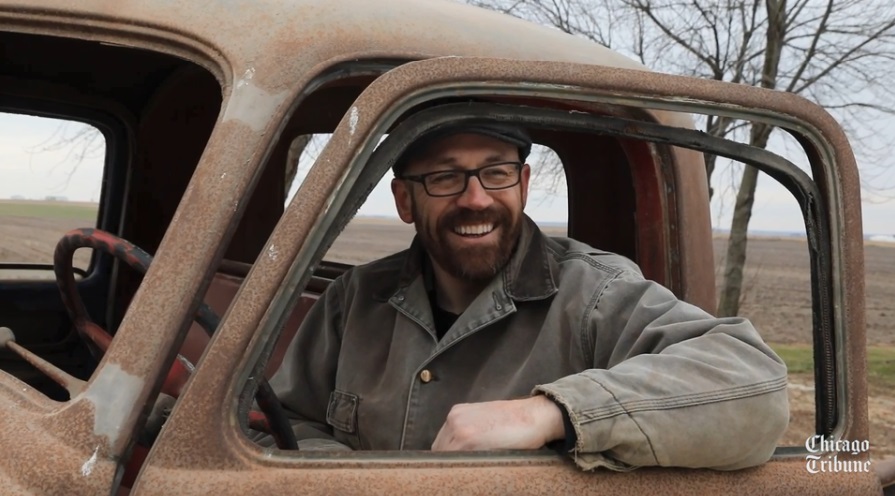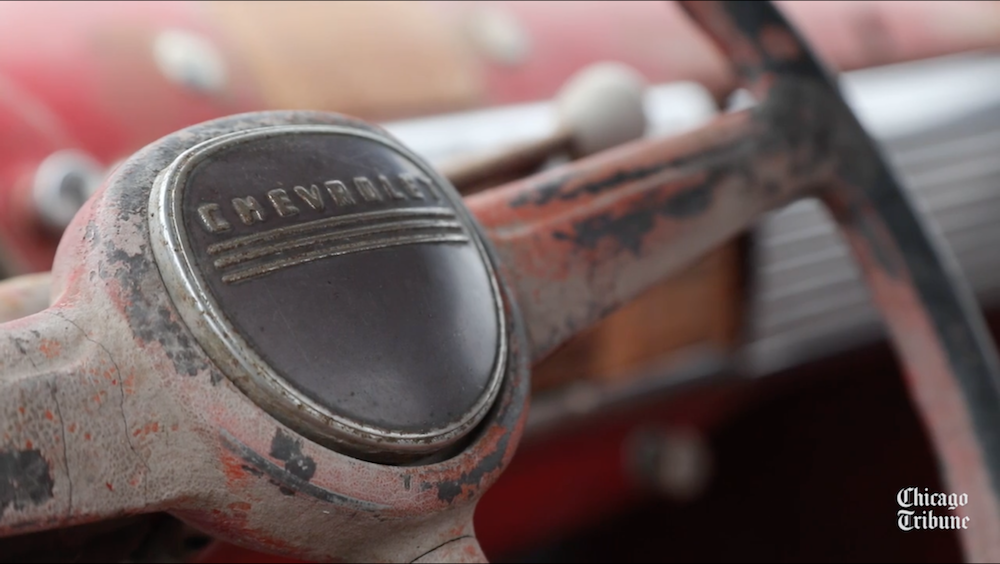Heartwarming 1950 Chevy 3100 Project Proves an Academic Point

A philosophical view of pickups backed up with a real story.
Well, it’s finally happened: The pickup truck is the subject of philosophical debate. That’s according to James C. Cobb, contributing editor at Zócalo Public Square and the Spalding Distinguished Professor of History Emeritus at the University of Georgia. Cobb has written an essay called “The pickup truck: An American icon” discussing the workhorse’s place in American history. The essay is part of What It Means to Be American, a joint project between the Smithsonian’s Museum of American History and Arizona State University.
But that’s not entirely why we’re writing about it. On top of reprinting the essay in its entirety, the Baltimore Sun has included a touching video (courtesy of the Chicago Tribune) about a son reuniting with his late father’s 1950 Chevy 3100 pickup. Together, these two viewpoints paint a perfect portrait of what makes the pickup such a cultural touchstone.
The Iconic Pickup
In his essay, Cobb begins by giving a very brief history of the humble pickup – including a Chevy shoutout for being one of the first automakers to get serious about trucks. By the time this happens in the 1930s, Cobb says that “… the pickup was a vital component of one of the most far-reaching transformations in American history: the mechanization and consolidation of Southern agriculture.”
But, Cobb points out that the ease, durability, and popularity of the pickup mark a massive cultural change in rural Southern life. Within a few decades, massive, highly-mechanized farms largely take over from tiny mom-and-pop operations. And while dwindling job prospects pushed more rural people into suburbs, the truck is initially shunned. Just a few decades later, however, the pickup begins to find buyers far away from the farm.
As Cobb notes:
Soon enough, however, rising metropolitan incomes and the growing popularity of camping, boating and other outdoor activities justified the acquisition of newer, better-kempt pickups, equipped with once unheard of comforts and conveniences like leather seats, air conditioning, extended cabs, automatic transmissions and power steering.
Annual sales of pickups topped 2 million by 1980 and had surged past 11 million in 2017.
Today, the pickup leads a life of contrasts. On the one hand, models like Chevy’s Silverado High Country offer Cadillac-like comforts and price tags to match; few ever see a day of hard work in their life. On the flip side, Cobb argues that buying a pickup is an act of sticking to your rural roots. Yeah, you might be spending over $50,000 on a truck, but it’s a truck. Cobb calls it “… a means of establishing … ties to a distinctly blue-collar identity in the course of flaunting their bourgeois prosperity.” In his closing remarks, Cobb sums up the pickup like this: “ For generations born on the farm, it may summon classically bittersweet nostalgia. For others, it has been a metaphor both for unvarnished rusticity and a laid-back middle-class existence.” And for Leland Wingert, it may be a little of both.
Rescuing his father’s truck
At first sight, this 1950 Chevy 3100 looks like either a perfect candidate for a total restoration, a wild custom job, or a potential hooptie. Instead, this truck will be a labor of love for a son to honor his late father.
The video starts with Leland Wingert of Chebanse, Illinois proudly standing with his project Advance Design Chevy. “My dad bought it, I believe, shortly after he got out of Vietnam,” He explains. As a kid, Leland remembers the truck mostly sitting out in front of his parents’ house. Around the age of 10 though, it disappeared. His father sells it to a neighbor, a farmer, who ostensibly puts it to work.
But as he tells it: “A couple years ago, I realized it was still sitting down there, and they weren’t driving it; it was sitting in a shed.” This year, at the insistence of his fiance Suzanne, Wingert went back to where he grew up and bought the truck.
The day he bought it, he took his mother with him. She remembered the truck, but not exactly fondly. “She was like ‘yeah, I remember this truck. Your father used to come pick me up in it when we’d go on dates. I was so embarrassed to be seen with him in this truck’” he says with a laugh.
The truck is in fairly rough shape; there’s little paint left, surface rust everywhere, no glass, and very little brightwork. But Wingert is optimistic that he’ll have it running without too much trouble. “I was told that the only reason this truck quit running was because, the guy I bought it from, he thinks the fuel pump went out.” But, he points out, it also hasn’t run in 25 years, so it might need a little coaxing to get running. Still, we know how tough these trucks are. Hopefully, a little Marvel Mystery Oil in the cylinders and a tune up will cure whatever ails it.
Despite its derelict look, Wingert’s Chevy looks like it has pretty strong bones. There doesn’t look to be much rot, it rolls freely, and its ancient tires still hold air. So what are his plans? “The color… is gonna be pretty much as it is: This patina and kind of rat rod look.” Once it’s running, he’s going to take it right over to the cemetery and show his father that his truck is still chugging along.
Two sides of the same coin
In many ways, Wingert’s story proves Cobb’s point. His 3100 is quite literally a link to his past. What’s more, that past was rural and seemingly simpler than things are today. He went home to rescue it. Once it’s done, his truck will serve as a bridge between his past, present, and future for years to come.
The pickup truck is a direct link to America’s hardworking history. It’s constantly evolving to fit the times, yet it sticks to a formula that’s barely changed in the past 100 years. Cobb may debate the pickup’s political connotations in his essay, but that’s for us humans to discuss. In the meantime, trucks will continue to work into their second century and beyond.





